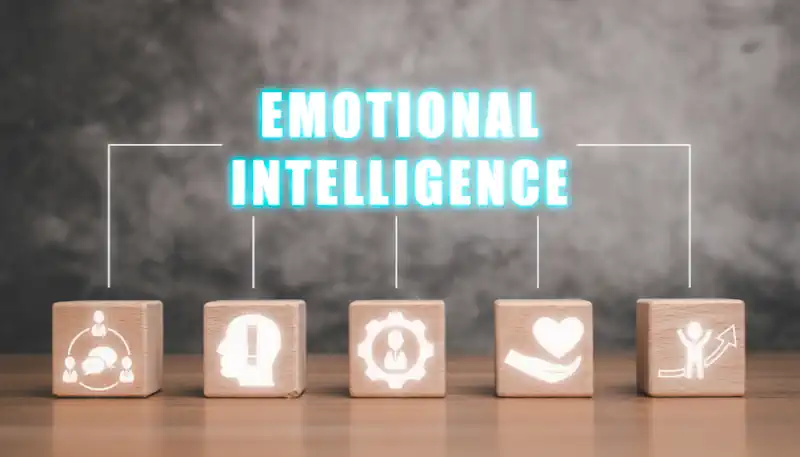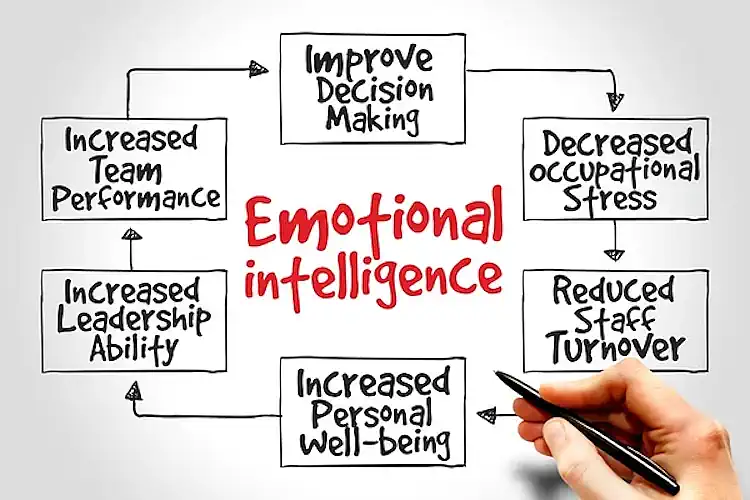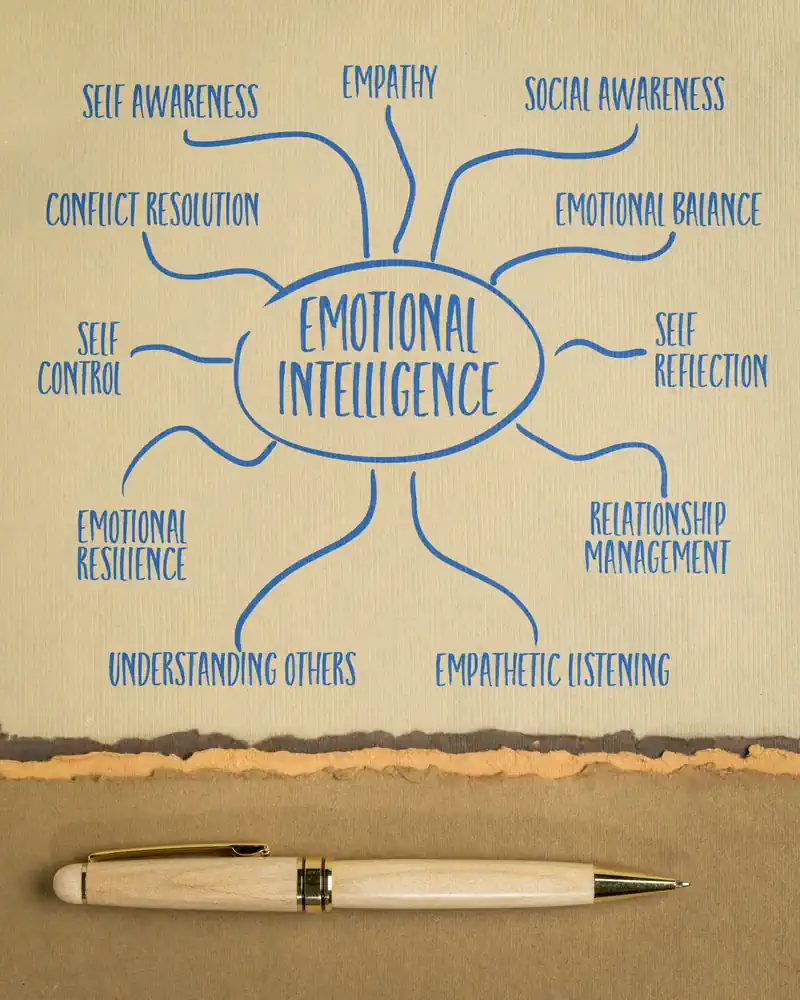Emotional Intelligence (EI) is the ability to understand and manage your own emotions, and those of others. In a leadership position, EI is crucial for creating a harmonious and productive work environment.

Components of Emotional Intelligence
- Self-Awareness: Recognizing your own emotions and their effects is the first step in managing them effectively. Self-aware leaders can identify their emotional triggers and understand how their feelings influence their thoughts and actions.
- Self-Regulation: Managing your emotions in healthy ways involves staying in control, even in stressful situations. Leaders who self-regulate don’t make impulsive decisions or attack others verbally; they remain calm and think clearly.
- Motivation: Being driven to achieve for the sake of achievement means having a passion for work that goes beyond money or status. Motivated leaders are resilient and committed to their goals, which inspires their teams to follow suit.
- Empathy: Understanding others’ emotions is essential for managing a team effectively. Empathetic leaders can build stronger relationships, show genuine care for their team members, and respond appropriately to their needs and concerns.
- Social Skills: Managing relationships to move people in desired directions is key for effective leadership. Leaders with strong social skills can communicate clearly, manage conflict, and work well with others towards a common goal.
The Role of EI in Leadership
Enhancing Decision-Making
Emotional intelligence (EI) plays a crucial role in leadership by enhancing decision-making processes. Leaders with high EI are able to consider both rational and emotional factors when making decisions, leading to more balanced and effective outcomes. By incorporating emotions into their decision-making, these leaders are able to create a more comprehensive approach that takes into account the impact on individuals and the team as a whole.
Building Strong Relationships
EI is instrumental in building strong relationships within a team. Leaders who possess high emotional intelligence are better equipped to foster trust and rapport with their team members. This trust cultivates an environment of open communication and collaboration, which ultimately enhances team performance. By understanding and valuing the emotions of their team members, emotionally intelligent leaders create a foundation of trust that allows for effective teamwork and synergy.
Fostering a Positive Work Environment
Emotional intelligence contributes to fostering a positive work environment within the team. Leaders who exhibit high EI traits create a supportive and collaborative atmosphere where team members feel valued and understood. This sense of appreciation and understanding leads to higher morale and productivity among team members. By acknowledging and managing emotions effectively, leaders can create a work environment that promotes positivity, teamwork, and a shared sense of purpose.
Benefits of EI in Leadership
- Improved Communication: Leaders with high EI can convey their messages more effectively and listen actively to their team members, ensuring clear and efficient information flow.
- Increased Team Cohesion: EI promotes understanding and reduces conflicts within teams. Leaders who display empathy and social skills help create a cohesive team that works well together.
- Better Conflict Resolution: Leaders with EI can navigate and resolve disputes more skillfully, maintaining harmony and preventing issues from escalating.
- Higher Employee Engagement and Retention: EI leads to more satisfied and loyal employees. When leaders show empathy and understanding, employees feel more valued and are more likely to stay with the organization.

Examples of Using EI in a Leadership Position vs. Not Using EI
Using Emotional Intelligence (EI) in a leadership position can significantly impact the way a leader interacts with their team and navigates complex situations. Leaders who use EI are more likely to demonstrate empathy, self-awareness, and effective communication skills. This can lead to improved team dynamics, better decision-making, and increased overall productivity.
In contrast, leaders who do not use EI may struggle with managing emotions, understanding team members’ perspectives, and fostering a positive work environment. This can result in conflicts, decreased morale, and hindered team performance.
Handling a Team Conflict
A leader who uses emotional intelligence notices growing tension between team members. Recognizing the potential impact on the team’s cohesion, they actively listen to each person’s concerns, demonstrating empathy and patience. By understanding both sides, the leader facilitates a constructive conversation, guiding the team toward a mutually agreeable solution. This approach not only resolves the conflict but also strengthens the team’s trust and collaboration.
In contrast, a leader who lacks emotional intelligence dismisses the conflict as trivial, failing to address the underlying emotions. This neglect allows the conflict to fester and escalate, ultimately creating a hostile and unproductive work environment.
Providing Feedback
An emotionally intelligent leader, when providing feedback, remains calm and focuses on specific behaviors rather than personal attributes. They deliver balanced feedback, acknowledging the employee’s strengths and areas for improvement. By offering support and encouragement, the leader helps the employee feel valued and motivated to improve.
On the other hand, a leader who does not use emotional intelligence might give harsh, generalized feedback driven by frustration. This impulsive criticism leaves the employee feeling demotivated and undervalued, which can lead to decreased performance and engagement.
Navigating Organizational Change
During organizational changes, a leader with emotional intelligence communicates clearly about the reasons for the change and its benefits. They address employees’ concerns with empathy, providing reassurance and resources to help them adapt. This transparent and supportive approach fosters a sense of security and cooperation among the team.

Conversely, a leader who lacks emotional intelligence might impose changes without explanation, ignoring the emotional responses of their employees. This lack of transparency breeds uncertainty and resistance, making the transition more challenging and less effective.
Recognizing and Rewarding Employees
An emotionally intelligent leader regularly acknowledges employees’ achievements, both publicly and personally. They understand that recognition should be tailored to individual preferences, ensuring that each team member feels genuinely appreciated. This approach enhances employee morale and loyalty.
In contrast, a leader who neglects recognition focuses solely on problems and rarely acknowledges good work. This neglect leads to employees feeling unappreciated and disengaged, increasing the likelihood of higher turnover rates.
Managing Personal Stress
A leader with high emotional intelligence is aware of their own stress levels and takes proactive steps to manage it, such as taking breaks, practicing mindfulness, or seeking support. By modeling healthy stress management techniques, they set a positive example for their team.
Conversely, a leader who ignores their stress allows it to build up, negatively impacting their interactions and decision-making. This unchecked stress can lead to burnout and poor leadership decisions, adversely affecting the entire team’s performance and morale.
Developing Emotional Intelligence
- Self-Assessment and Reflection: Regularly evaluate your emotional responses to situations. Reflection helps identify areas for improvement and reinforces positive behavior.
- Seeking Feedback: Encourage and use feedback from others to improve your EI. Constructive criticism provides valuable insights into how your actions affect others and how you can adjust.
- Continuous Learning and Development: Engage in training programs and read about EI to enhance your understanding and skills. Continuous learning keeps you updated on best practices and new insights.
- Practicing Mindfulness and Stress Management: Techniques like meditation can enhance EI by helping you stay calm and focused, reducing stress, and improving your emotional regulation.

Summing Up
Emotional Intelligence is vital for effective leadership. By developing EI, leaders can enhance their decision-making, improve team dynamics, and create a more positive work environment. Cultivating EI is a continuous process, but the benefits for both leaders and their organizations are substantial.
Suggested Resources
Here are some suggested readings and resources for further learning on Emotional Intelligence and leadership:
- Books:
- Emotional Intelligence: Why It Can Matter More Than IQ by Daniel Goleman
- Primal Leadership: Unleashing the Power of Emotional Intelligence by Daniel Goleman, Richard Boyatzis, and Annie McKee
- Dare to Lead: Brave Work. Tough Conversations. Whole Hearts. by Brené Brown
(Books available on Amazon, affiliate links)
- Articles and Research Papers:
- “What Makes a Leader?” by Daniel Goleman, Harvard Business Review (subscribers only)
- “How Emotional Intelligence Became a Key Leadership Skill” by Andrea Ovans – Harvard Business Review
- Websites:
These resources offer comprehensive insights into the role of emotional intelligence in effective leadership, providing both theoretical knowledge and practical applications.
